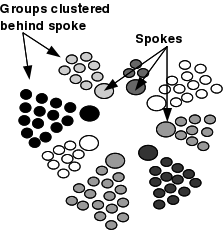I was back at Hinkley power station this weekend for the Fukushima anniversary action. Actions at Hinkley have a new poignancy – the site for the new and much bigger Hinkley C reactor has now been cleared, despite valiant efforts to hinder it (a tree-sit and occupation of some farm buildings), and G4S security guards are everywhere.
Once again my role was that of spokescouncil facilitator. But whereas last time we had several days at a pre-action camp to help people get used to the idea of affinity groups and consensus, and in particular spokescouncils, this action had no such preamble. All spokescouncils were held in the immediate vicinity of the station and mid-action.
Over the course of 24 hours we held 3 meetings, all of them spokes-only meetings, so as not to distract people from the blockade itself.
- The first to check in, share information and respond to anything that might arise from the group.
- The second to plan the transition from the big ‘surround the station’ action to the more contentious blockade. Ingeniously, the group decided to solve the problem by moving the meeting into the roadway, thus the meeting became the blockade, and runners were sent out to tell others that the blockade had begun.
- The third to check out how much energy the group had for maintaining the blockade after a cold and (for many) sleepless night and decide on an end time and process.
I don’t want to repeat the learning from previous involvement in this campaign. If you want that, have a glance at the previous post. But I thought I’d update you with what’s working well and less well (in my opinion, of course) in the world of spokescouncil consensus, Stop New Nuclear style
Working well?
- I continue to be impressed at the willingness to co-operate within meetings. It felt like we were doing at least half decent consensus in a disparate group of people whose only connection was the choice to take part in a particular action. None of the posturing and positioning that I’ve witnessed elsewhere. And all this with a short introduction to the mindset needed for consensus, to hand signals and to spokescouncils at the start of each meeting.
- The short intro, and the action setting mean that the group is starting the consensus process without necessarily being aware of where it’s taking them. I’ve been introducing each step of the process as the meeting unfolds (“lets hear a few perspectives?”… “any more perspectives that we need to hear?”…. “can anyone see a way forward that brings together what we’ve heard so far”… “any major objections to what we’re hearing”… and so on). It’s a potentially risky strategy, but one that’s working at the moment.
And less well?
- The lack of a pre-action camp meant that not everything I’d hoped we could do to improve awareness of spokescouncils was able to take place – induction meetings and workshops, a flier handed out at the welcome tent, and so forth.
- I probably should have taken a deep breath and done a formal intro to the whole group over the PA system since one was available. Partly this was an aversion to public speaking, and partly deference to those who had come to speak and whose words seemed so much more necessary than mine – for example the young Japanese couple who shared their personal story of the impact of the Fukushima disaster.
- If spokescouncils are an affinity group tool, then we’re not really doing spokescouncils at all! Many, possibly most, of the people present were not in affinity groups. Some were in looser group formation (a few mates, the folk they traveled with on the coach…). Others were there as individuals. Whilst the spokescouncils did attract people from the looser groups, many of the individuals were essentially not represented. As I see it this will continue to be the case until we succeed in encouraging greater take-up of the affinity group model, or start having fishbowl-format spokescouncils. At these latter meetings it’s easy enough to cluster individuals into ad hoc groups and invite them to select a spoke.
For all of these failings, in the relatively small confines of this action (the blockade focused on one gate only), and in the relaxed atmosphere of the action (once again the police took a laissez-faire approach), the meetings are working. Decisions are being networked out to the wider crowd, and I saw no signs of them being ignored. When there’s more than one physical location, and tougher policing? Then we’ll need the discipline of affinity groups and more experience in consensus. But we have a little time….



